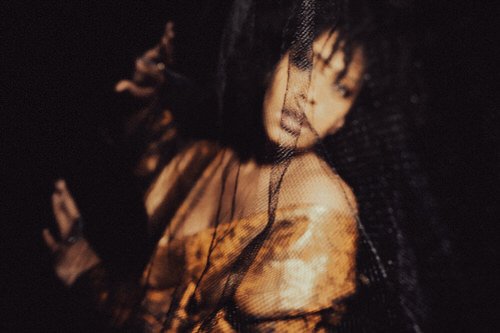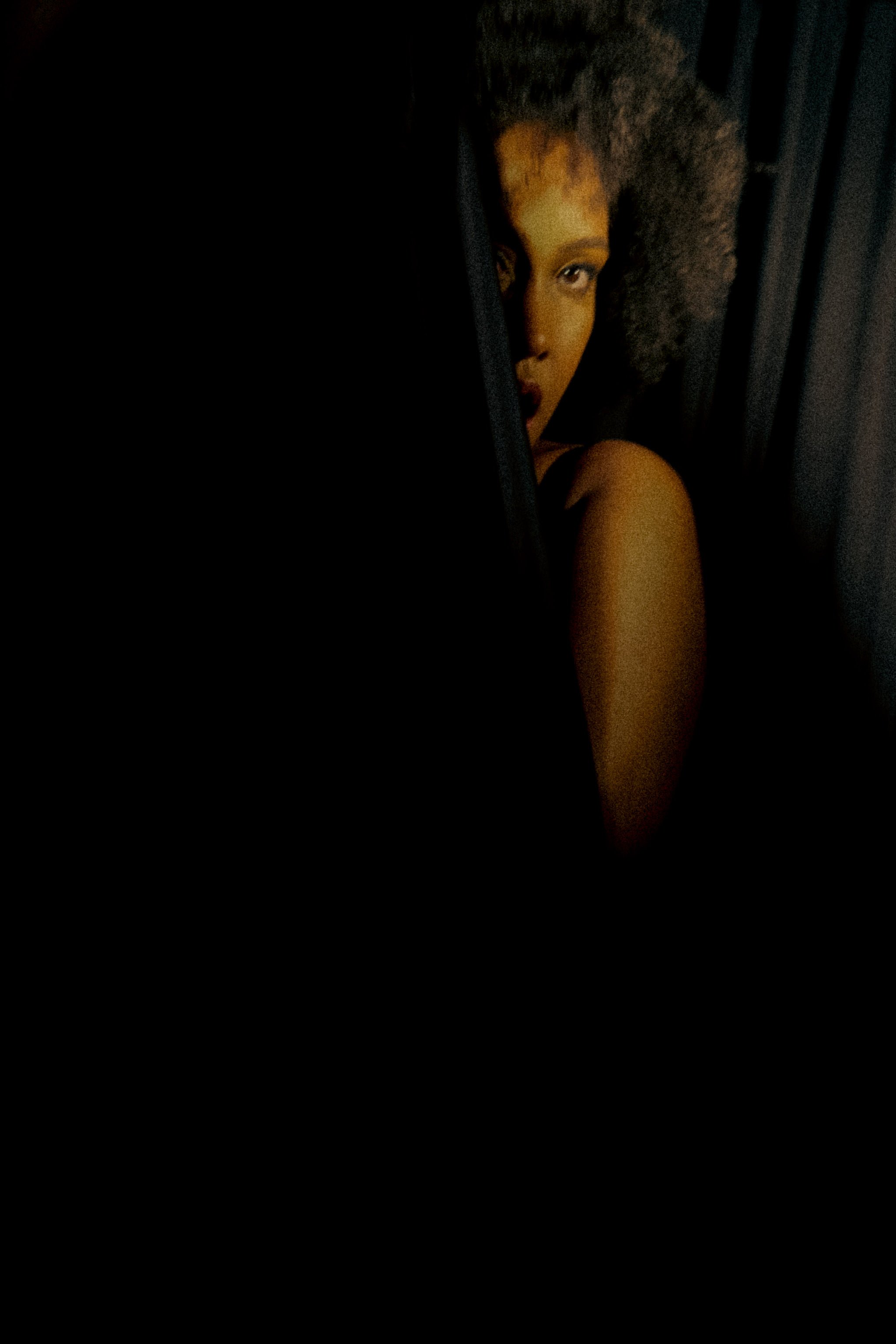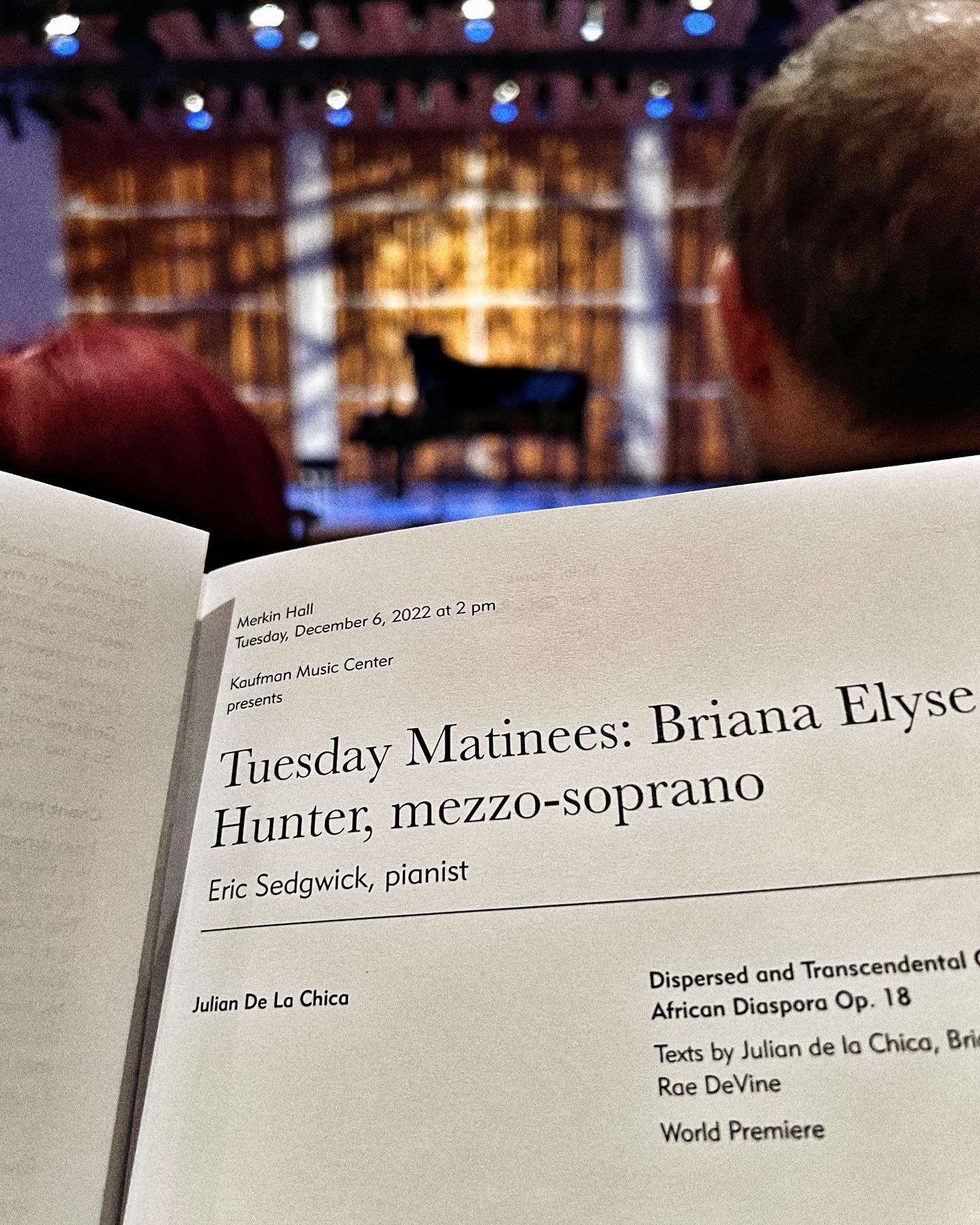Briana Hunter:
Dispersed and Transcendental Chants, Op. 18
Release: Nov 17, 2023
Irreverence Group Music (IGM) presents the debut studio album by opera singer Briana Hunter, Dispersed and Transcendental Chants, Op. 18. Commissioned by Hunter and composed by Julián De La Chica, this song cycle consists of 10 chants, a prelude, and a postlude, drawing inspiration from the rich cultural, religious, and spiritual traditions of the African diaspora. It invites listeners on a journey through the singer’s self-discovery, viewed through the lens of culture and lineage. The cycle integrates poems written by Hunter herself, and artist Rae de Vine. The final collection of poetry was curated by De La Chica, infusing a deeply personal touch into the musical narrative.
The cycle had its world premiere in December 2022, presented by Hunter, accompanied by pianist Eric Sedgwick at the Merkin Concert Hall at kaufman music center, which commissioned the work.
Listen to Prelude: Annunciation
Dispersed and Transcendental Chants
-
Format: Album
Release: November 17, 2023
Catalogue: IGM-041
GTIN/EAN/UPC: 4099885688904
Producer: IGM
Commissioned by Briana Hunter & Kaufman Music Center -
Briana Hunter (Mezzo Soprano)
Eric Sedgwick (Piano) -
Julián De La Chica
-
Julián De La Chica
Rae De Vine
Briana Hunter -
De La Chica — Dispersed And Transcendental Chants, Op. 18:
01. Prelude: Annunciation
02. Chant 1: Lwa
03. Chant 2: Initiation
04. Chant 3: Bondye
05. Chant 4: Great Grandfather
06. Chant 5: Yemaya
07. Chant 6: Confession
08. Chant 7: Mother
09. Chant 8: The Word
10. Chant 9: El Poeta
11. Chant 10: Ring Shout
12. Postlude: Closing -
Commissioned by Briana Hunter & Kaufman Music Center
Produced by Irreverence Group Music
Music by Julián De La Chica
Lyrics by Julián De La Chica, Rae De Vine & Briana HunterBriana Hunter - Mezzo Soprano
Eric Eric Sedgwick - PianoRecorded, mixed & mastered by Greg DiCrosta
at Firehouse 12, New Haven, CT
Edited by Julián De La Chica
at IGMLab Music, Brooklyn, NY
Performed on Steinway “D” Hamburg (CD-79)
Piano Technician: Timothy J. RobinsonAlbum Notes by Steve Smith
Artwork/Cover: IGM
Photography by Julián De La Chica
Videos by IGMJulián De La Chica’s music is published
by Vagabundo Music Publishing, Inc. (BMI)
Manufactured and marketed
by Irreverence Group Music (Brooklyn, NY)
Made in US. Total time: 50 min
Ⓟ 2023 IGM & © 2023 Opera Poodle

Music NOTES
By Steve Smith
Away A somber B tolls in whole notes, a bell signaling the start of a rite. An annunciation, intimate and steadfast, summons the listener: Attend to the mystery that I will tell you.
The angel told me: You are the force that crosses borders.
The ineffable is present from the start of Dispersed and Transcendental Chants, Op. 18, a song cycle created by composer Julián De La Chica with mezzo-soprano Briana Hunter and artist Rae de Vine. The cycle, completed in 2022, comprises 10 songs designated “chants,” framed by a prelude and a postlude. The borders crossed are not only metaphorical; the work embraces and synthesizes disparate cultural and musical traditions, and blurs boundaries between the roles of creator and interpreter.
De La Chica and Hunter came together at the singer’s behest, the composer recalls. Having responded strongly to a previous cycle by De La Chica, Experimentelle und unbestimmte Lieder, Op. 9 (2016), Hunter sensed a potential collaborator for an intensely personal project she’d envisioned.
The spirits whisper verses to the people who need help.
“She shared stories about her great—grandfather, her ancestral roots,” De La Chica recalled of his initial meeting with Hunter. “And, of course, we discussed the current state of the music scene, the persisting patriarchal elements in many institutions, and the present openness to Black singers and composers.”
De La Chica responded strongly to Hunter as both an artist and an advocate. “First and foremost, her voice: powerful, fiery, impactful,” he said. “Additionally, her constant eagerness to collaborate with the community—by community, I mean an audience that may not always be as present: Latino composers, female composers, the Black community, the LGBT community.”
Talk to me, spirits of light and darkness, the ancestors of my ancestors, patient and benevolent.
Briana’s great grandparents on their wedding day.
Photo courtesy of Briana's family archive.
For any vocalist partnering with a composer in a venture involving words, the choice of writers and texts is paramount—and profoundly personal. This certainly was true for Hunter, who envisioned building a new piece using her own poetry. “I wanted this album to be extremely personal and vulnerable,” she said, “and including a few of my words I had written but not yet shared with the world felt appropriate.” She presented De La Chica with a collection of her poems, “and he chose which ones spoke to him strongly enough to set and fit the story arc of the song cycle,” she explained.
The emergence of a sensation of ritual was no coincidence, but rather a choice rooted in Hunter’s perception of De La Chica’s sound world. “Julián’s music is very experiential: it’s about creating a soundscape to transport you auditorily, and we wanted to use that to invoke in my case my ancestors,” Hunter explained.
“In live performance,” she added, “it would not be unlike a religious ceremony, where we as an audience and performers leave the outside world at the door, and enter a liminal space where we commune with those who came before us.”

Take 45. Movement. Exercise II.
Based on Chant 10: Ring Shout
I’ve always known your name, but never the words to your songs.
De La Chica describes an intensely collaborative process of creation, one in which he and Hunter both took an active hand in forming a narrative arc from their own words and ideas, with further input from Rae De Vine, an artist, activist, and educator.
Briana's great grandparents (paternal side) on their wedding anniversary.
Photo courtesy of Briana's family archive.
“Rae and I have a strong friendship and deep connection that has lasted many many years,” Hunter explained. “We often speak about the wisdom that lives inside of deep intuition, things we have both known about our families or lineage that were later confirmed. So much of the knowledge, rituals, and practices of Africa via the diaspora has been passed on through oral traditions, so there is a trusted wisdom in many ways that comes from within.”
The texts selected for Dispersed and Transcendental Chants intimate heritage and family, achievement and sacrifice, doubt and perseverance. De La Chica set them in a manner that embraced their vulnerability and strength, their mystery and profundity, with flexible and responsive music that always enhanced and never overwhelmed. He and Hunter met again several times to refine and polish the cycle’s final form.

Take 46. Ritual and invocation. Exercise I.
Based on Chant 2: Initiation
“On one hand, she showed great respect for my musical aesthetic,” De La Chica said of Hunter, “and on the other hand, she proposed masterful ideas. She also played a significant role in the lyrics, sharing some of her most personal poetry, which brought the cycle full circle, connecting the ancestral part to the present personal aspect.”
El mundo guarda silencio cuando el poeta calla. Y ruego al buen dios que el poeta grite, porque su llanto es nuestra redención.
Hunter, in turn, appreciated the wide range of expression De La Chica provided in his settings. “I was really interested in inventing and experimenting with different ways to characterize each piece,” she said. “There’s variety in rhythm, in tone, in line; it can be incredibly legato, or very disjointed. All of that is for a reason, and is in large part due to how Julian chose to set the music. He and I had a great time playing with it, and he was also really clear about how he heard things.”

Take 43. Introspection. Exercise IV.
Based on Chant 9: El Poeta
She doesn’t hear music when she writes poetry, she said, so she was fascinated to gauge De La Chica’s responses. “It was really interesting to hear what music my words brought out in him, the places he added motion, the text he wanted to repeat,” she said. Still, Hunter was struck by how often their intuition of sound and sequence aligned.
She cited the experience of singing her own words in “Confession” as an example. “I am still transported to the place I was when I wrote them in my mind,” she explained, “but I’m also very aware of where I am in the process of the ritual we started. It’s entering the section where there is a crisis of faith, doubt, shadow work taking place. Going into the dark to find what lives there. Working things out.”
I know I contain multitudes within...

Take 22. Introspection. Exercise V.
Based on Chant 6: Confession
Illustrating her collaboration with De La Chica, Hunter points to a moment near the cycle’s end that she asked the composer to alter, seeking a specific effect. “I wanted it to feel like a cracking open, or a deep satisfying exhale, because the end result of this journey is a positive one,” she said. “In all of the hardship, I am here living a life I was able to choose for myself, continuing to be guided by those before me.”
Artists understandably can be intensely protective toward their own creative labors. But discussing Dispersed and Transcendental Chants with De La Chica and Hunter illustrates a harmonious process of give and take, sans preciousness or defensiveness. The result is a cycle at once individual and universal: the hallmark of enduring art since time immemorial.
About the Author
Steve Smith is a journalist, critic, and editor based in New York City. He has written about music for The New York Times and The New Yorker, and served as an editor for the Boston Globe, Time Out New York, and NPR.
BTS | Interview
Photography & Process
I often say that, for me, and perhaps this is a generational thing, music and imagery are intrinsically connected. In fact, I can listen while seeing an image, and I can see images with the music. Briana and I were exploring the idea of visually documenting the album, and it was a wonderful experience. Besides being a great singer, Briana is a fantastic actress, so portraying a character is something she does convincingly and organically. However, the best part was when she decided to "strip away" any character and reveal her true self, with all the vulnerability that could bring. That was my idea. My photography, like my music, explores the minimal, the raw. It seeks to delve into what is left unsaid, what is not seen. And the exercise was precisely that, so the process involved listening to the album while taking the photos, reaching moments of deep communion between the music, the story, and the imagery.
— Julián De La Chica
Takes 35, 09, 60 & 10
Retrospection. Exercise I.
Based on Postlude: Closing




Take 46. Ritual and invocation. Exercise II.
Based on Prelude: Annunciation

Take 69. Movement. Exercise V.
Based on Chant 10: Ring Shout
Related VIDEOS
World Premiere PHOTOS
Julian De La Chica, Briana Hunter, Rae De Vine, and Eric Sedgwick, after Briana's recital, where she premiered the song cycle Op. 18, Dispersed and Transcendental Chants.
Merkin Concert Hall at kaufman music center,
New York City.
Music Program.
Merkin Concert Hall at kaufman music center,
New York City.
Press & LINKS
5 Questions to Briana Hunter I Care If You Listen
Briana Hunter New York Weekly
Briana Hunter CSMusic Singer Spotlight
Briana Hunter OperaBox score
Briana Hunter Davidson College







